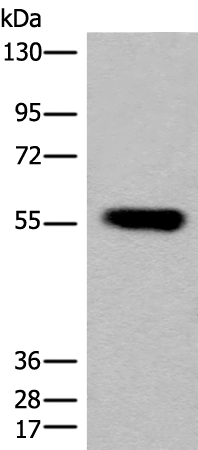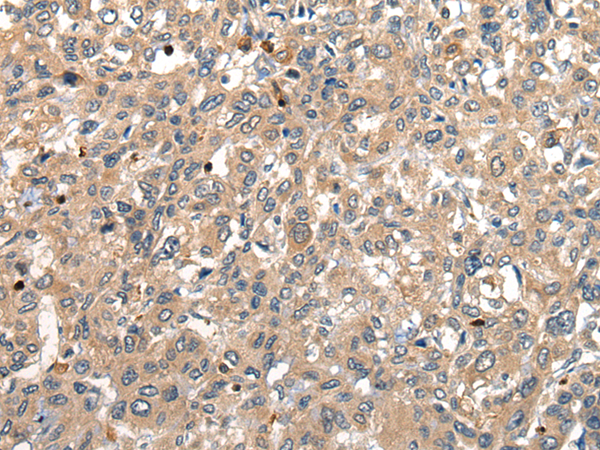

| WB | 咨询技术 | Human,Mouse,Rat |
| IF | 咨询技术 | Human,Mouse,Rat |
| IHC | 1/25-1/100 | Human,Mouse,Rat |
| ICC | 技术咨询 | Human,Mouse,Rat |
| FCM | 咨询技术 | Human,Mouse,Rat |
| Elisa | 1/5000-1/10000 | Human,Mouse,Rat |
| Aliases | p57; IMD8; TACO; CLABP; HCORO1; CLIPINA |
| WB Predicted band size | 51 kDa |
| Host/Isotype | Rabbit IgG |
| Antibody Type | Primary antibody |
| Storage | Store at 4°C short term. Aliquot and store at -20°C long term. Avoid freeze/thaw cycles. |
| Species Reactivity | Human, Mouse, Rat |
| Immunogen | Synthetic peptide of human CORO1A |
| Formulation | Purified antibody in PBS with 0.05% sodium azide and 50% glycerol. |
+ +
以下是关于CORO1A抗体的3篇参考文献示例,包含文献名称、作者和摘要概括:
---
1. **文献名称**:*Coronin 1A is essential for T cell homeostasis and immune function*
**作者**:Föger, N., et al.
**摘要**:该研究通过CORO1A抗体检测其在T细胞中的表达,发现CORO1A缺失会导致胸腺细胞发育异常和免疫缺陷,提示其在T细胞稳态中的关键作用。
---
2. **文献名称**:*Mutations in CORO1A cause a severe combined immunodeficiency*
**作者**:Moshous, D., et al.
**摘要**:研究利用CORO1A抗体分析患者样本,发现CORO1A基因突变与严重联合免疫缺陷(SCID)相关,揭示了该蛋白在免疫细胞信号传导中的功能。
---
3. **文献名称**:*Coronin 1A regulates actin dynamics and immune synapse formation in T cells*
**作者**:Randzavola, L., et al.
**摘要**:通过CORO1A抗体阻断实验,证明CORO1A通过调控肌动蛋白聚合参与T细胞免疫突触形成,影响细胞迁移和激活过程。
---
**备注**:以上文献为示例性质,实际引用时建议通过PubMed或Google Scholar检索最新研究,并核对具体实验方法和抗体应用场景。
CORO1A (Coronin 1A) is a member of the coronin protein family, which plays critical roles in regulating actin cytoskeleton dynamics, immune cell function, and intracellular signaling. Encoded by the *CORO1A* gene, this protein is predominantly expressed in immune cells, particularly T lymphocytes, neutrophils, and macrophages. It facilitates cell migration, phagocytosis, and T-cell receptor signaling by interacting with actin filaments and modulating their polymerization or stabilization. CORO1A also participates in calcium-dependent pathways and vesicle trafficking, influencing immune responses and inflammation.
Mutations in *CORO1A* are linked to severe immunodeficiency disorders, such as autosomal recessive severe combined immunodeficiency (SCID), characterized by impaired T-cell development and function. This association underscores its essential role in immune system regulation.
CORO1A antibodies are vital tools in biomedical research, enabling the detection and quantification of CORO1A protein in techniques like Western blotting, immunofluorescence, and flow cytometry. These antibodies help investigate CORO1A’s involvement in immune pathologies, cancer metastasis (due to its role in cell motility), and autoimmune diseases. Commercially available CORO1A antibodies are typically raised in hosts like rabbits or mice, targeting specific epitopes with validated specificity for human, mouse, or rat samples. Their applications extend to studying molecular mechanisms of immune dysregulation and evaluating therapeutic targets in preclinical models.
×